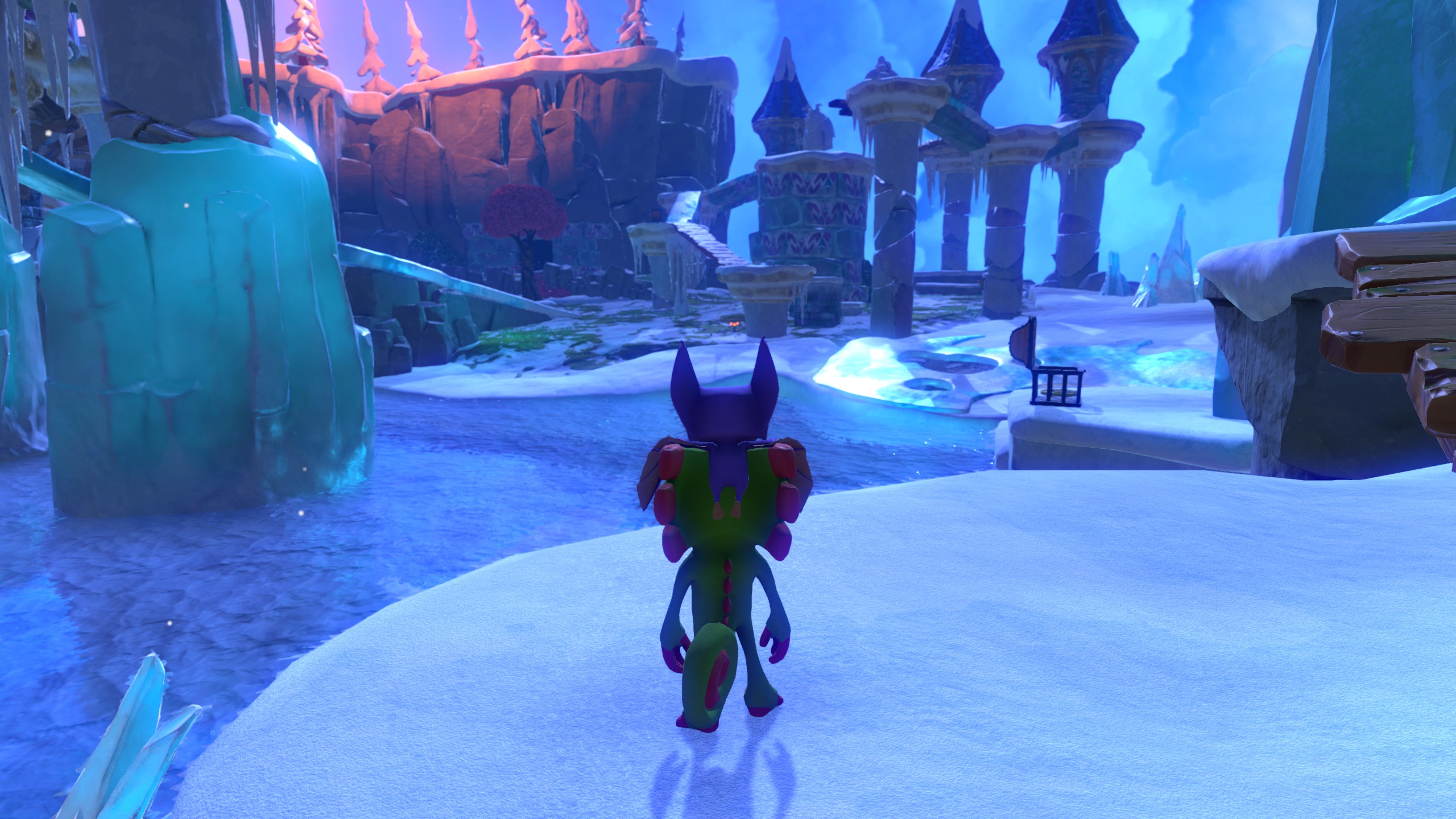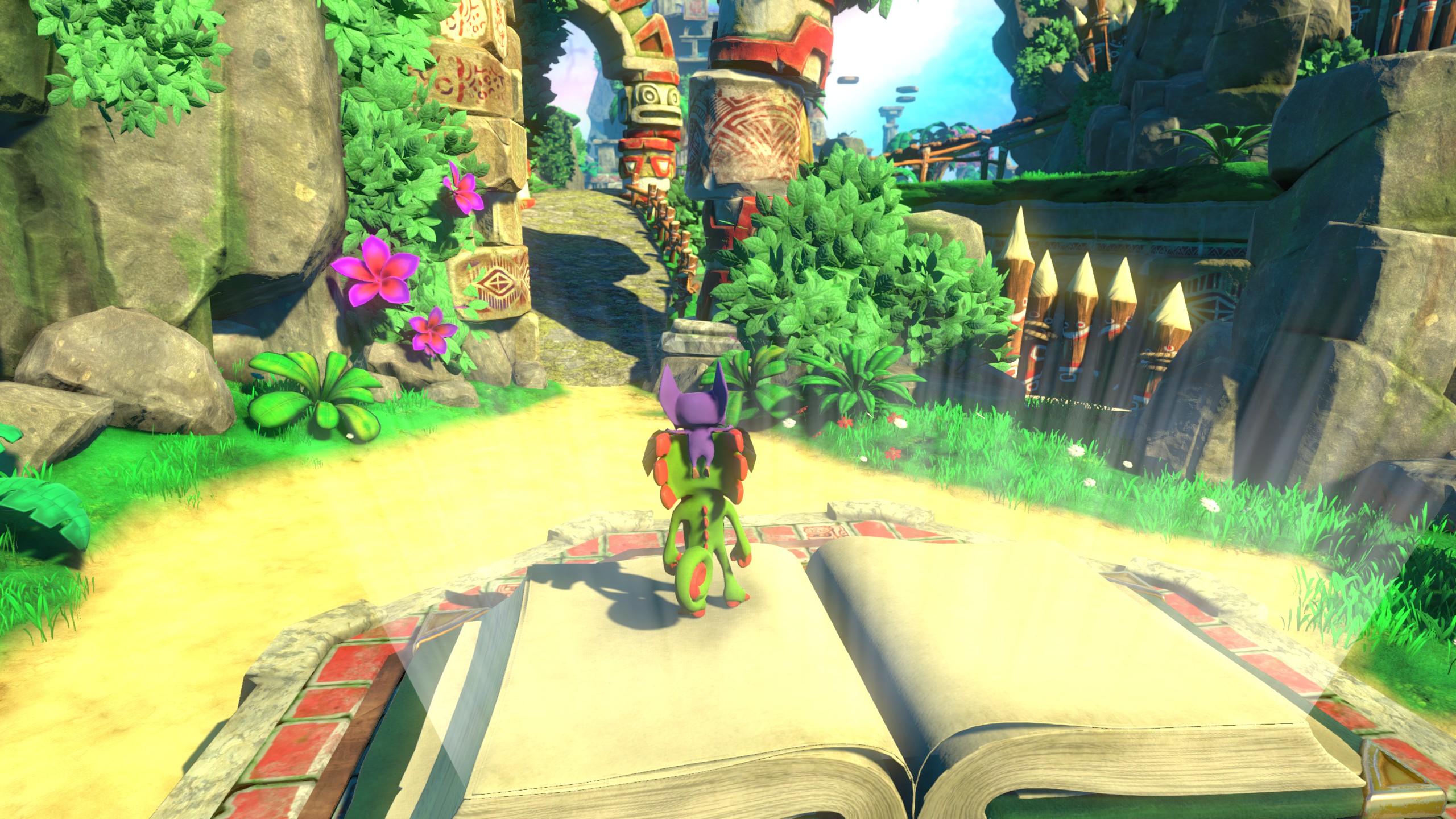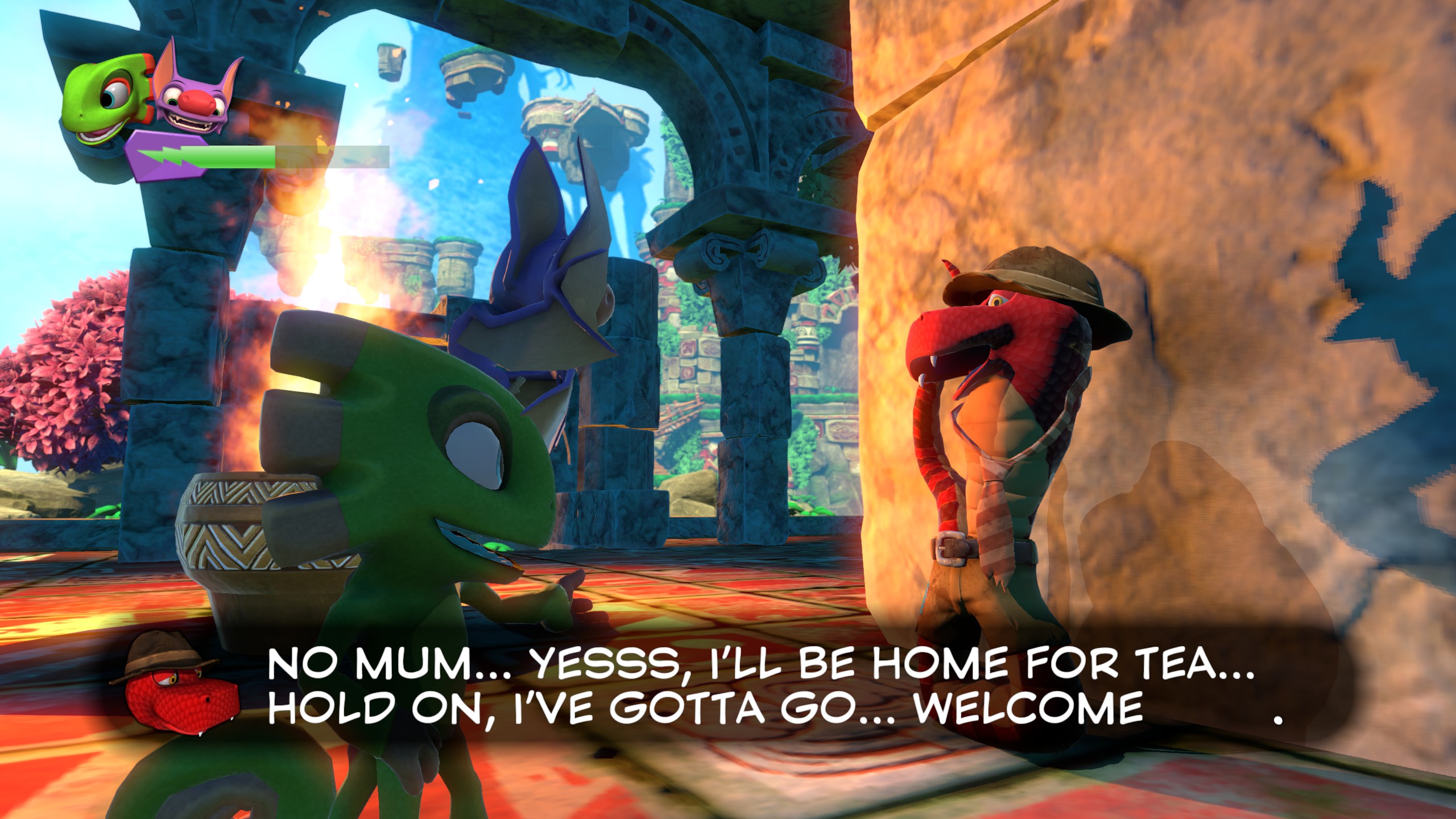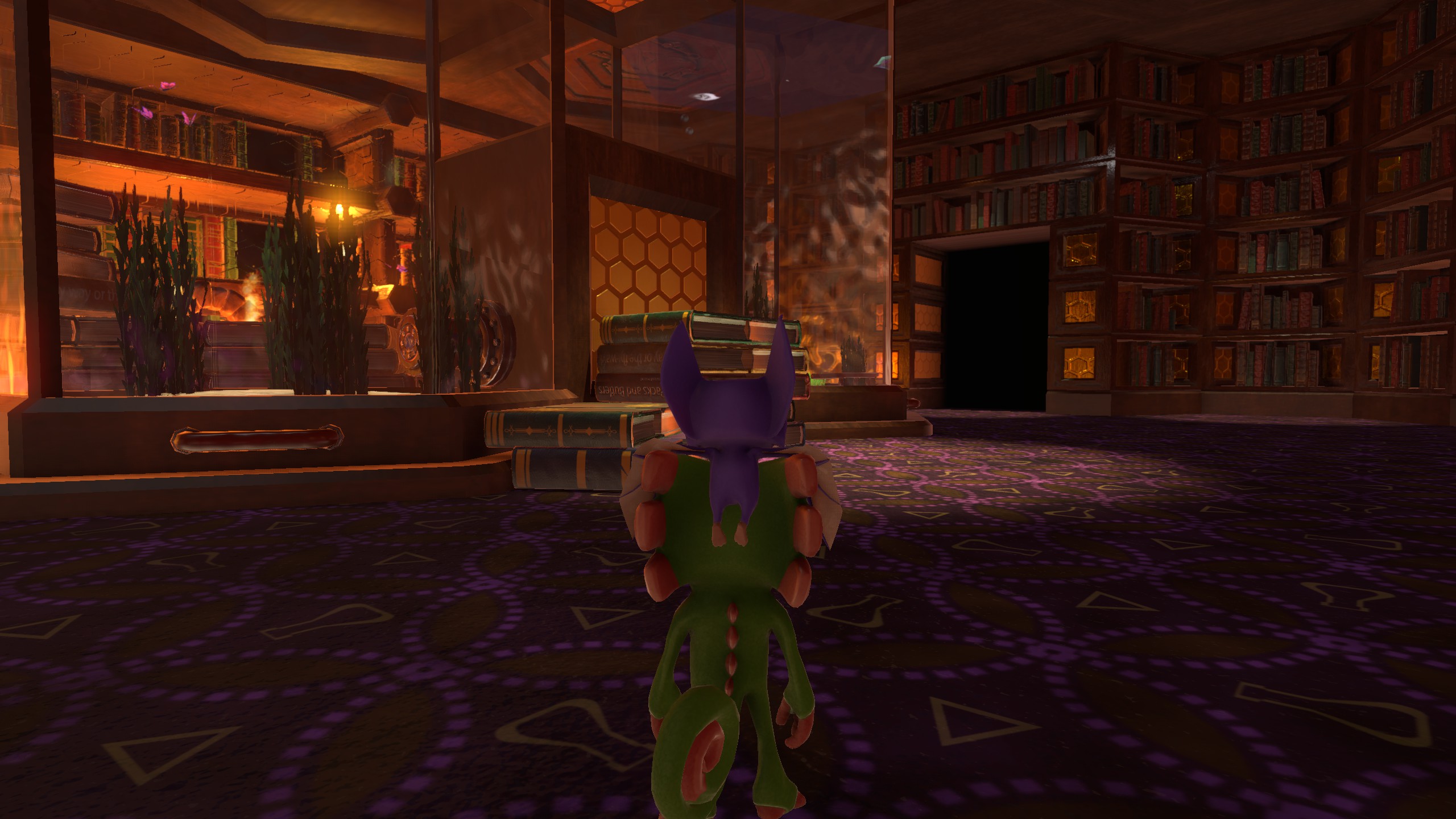Review: Yooka-Laylee
Written by Ben Vollmer
Yooka-Laylee is a return to form for the “3D Collectathon” genre. The tight movement, compelling worlds and off-kilter writing all serve an homage to a genre that has long lost its luster. For a genre that never really had a chance to find a spotlight again, the crowd-funded Yooka fractures the confines that have contained collectathons for too long.
Precise movement has long been a staple of the genre and Yooka has strained focus on the matter. Between a group of core movements, including a spin dash, roll, sprint, jump and hover, the game manages to create platforming the likes of old Rare titles such as Banjo-Kazooie and Donkey Kong 64. Without committing to platforming as its major pull, Yooka relies a lot on moving from undefined platforms to more undefined platforms. Lets take the game’s second level Glitterglaze Glacier, for example.

This level embodies a lot of what Yooka does different from a traditional 3D platformer. As seen in the screenshot above, the game focuses more on providing you a geographical contour to play with than defined areas to jump and fly to. This works for a handful of reasons, the first of which is that is emphasizes exploration rather than a more clearly defined route to take in order to reach your end goal. Moreover, platforming gets a little more creative. Without a standard set of jumps to make, which does exist in the game, just not in the majority, finding your way to a location becomes almost a puzzle in itself.
It also keeps the game from having the kind of iconography that makes certain areas distinct. Yooka-Laylee‘s biggest issue is its uniformity. Many parts of a level look nearly indistinguishable from others, even though the game makes a valiant effort to have certain areas stand out from others, it can a huge problem when many of the game’s puzzles rely on being able to identify specific areas.
Playing with a standard controller, the game has remarkably tight controls when compared to previous games in the genre. Matched with a better, but still flawed, camera, Yooka-Laylee isn’t nearly the headache that its genre predecessors were. This might be a result of wider and much more open-ended world design than collectathons have ever seen.

Yooka’s largest strength is in its charm. The game purposefully and densely relies on former tropes of the genre, including muffled and grunting character voices, weird spots of rhyming and a sense of humor filled with double entendres. While certainly a nostalgia kick, Yooka manages to make distinct improvements in nearly every facet of the game. The levels, as opposed to the design within those levels, all feel incredibly unique when standing against one another.
The lush greens and blues of the opening level, named Tribalstack Tropics, juxtapose themselves against the red felt of Capital Cashino. The level’s maintain a certain openness and verticality to them, but there’s no confusing one level for the other. The color pallet is impressive for a small-budget title like Yooka, and the crisp visuals are a wonderful surprise. It’s a shame that the game doesn’t rely more on these distinct visuals to tell its story, which is remarkably dull and uninteresting in comparison.

It isn’t a surprise that Playtonic, the developer behind Yooka-Laylee, wanted a narrative more reminiscent of the genre. The disappointment is that, especially with the immense strides in storytelling that video games have taken, that Yooka doesn’t use its vast cast of characters (many of which are hilarious and individualized) to help tell its overarching narrative. Instead, we’re left with a lackluster evil bee (appropriately titled “Capital B”) and his plan to convert all of the “Pagies” – which act as this game’s Jiggy or Star – into profit. It’s an absurd plot that doesn’t make much sense, but it will only disappoint if you’re expecting more than what the genre has given in the past.
It’s also worthy of mention that Yooka and Laylee are two separate characters, though, neither has a distinguished personality. Yooka especially, the bright green lizard, serves as a the set-up man for most of the game’s jokes. It’s frustrating that the two never really grow a repertoire, but Playtonic’s resources were likely spent in other areas they deemed more important.
There’s quite a bit of gameplay variety to be found in Yooka-Laylee, with each area having its own set of puzzles, a retro-style arcade game, a minecart track and some mediocre boss fights that have you play the game in new ways. The minecart areas stand out the most, both because of their difficulty (which is largely due to some delayed controls and a bad camera angle) and strange 2.5-dimensional elements. They are an eerie reminder of the old Donkey Kong Country minecart levels, but they don’t have the same rampant pace to them. The controls are just sluggish enough that some of the minecraft areas become next to impossible. Thankfully, much like the few other dull areas in the game, they are saved by Yooka-Laylee’s incredible score.
Composers David Wise, Grant Kirkhope and Steve Burke are likely the best part of an already solid game. Many of the game’s scores will stay etched in your brain long past when you leave them, especially when you get stuck on a specific part longer than you’d like. A lot of the frustration that may be felt in other games is simply shrugged off when you get to listen to a track like this or this. The ambient charm and light-hearted variety give the game just the shot in the arm it needed to create long lasting, memorable areas and worlds. Put simply, even in a year where a Zelda game exists, Yooka-Laylee is an early front runner for score of the year.

Many will argue that Yooka-Laylee falling short in many of the same areas that its predecessors did are signs of a group of developers who have had the industry pass them by. Conversely, it’s those same shortcomings that make for such an interesting and unique title. Yooka-Laylee is such an odd blend of character, style and nostalgia that you forget where the game ends and where the memories begin. In large part, the game’s perception will be dependent on expectations. This is a game that improved in areas the genre was already successful in and continued to be lackluster in facets the collectathon genre has always struggled with.
It isn’t without its fair share of issues, many of which are shared by past games in the genre, but the game stands out as an undeniable success. Yooka-Laylee is the return of the collectathon genre, with all of the good and the bad attached.
Score: 8.0
